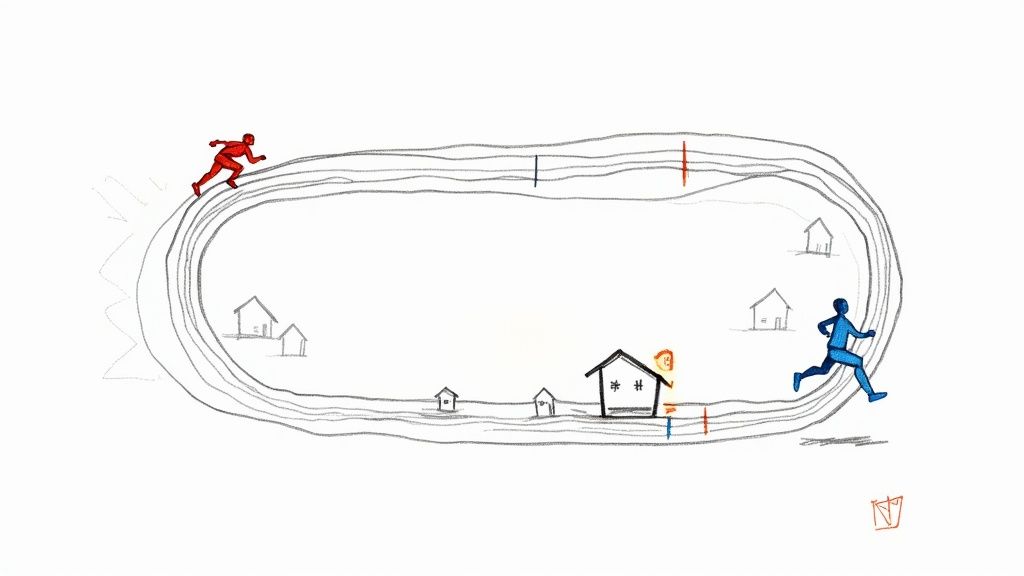
seo and ppc working together
SEO and PPC Working Together for STRs
Posted on Nov 22, 2025

Think of PPC as the sprinter and SEO as the marathon runner. On their own, they’re effective. But when SEO and PPC work together, they become an unstoppable force that can dominate search results and keep your booking calendar full.
The Power Couple of Search Marketing
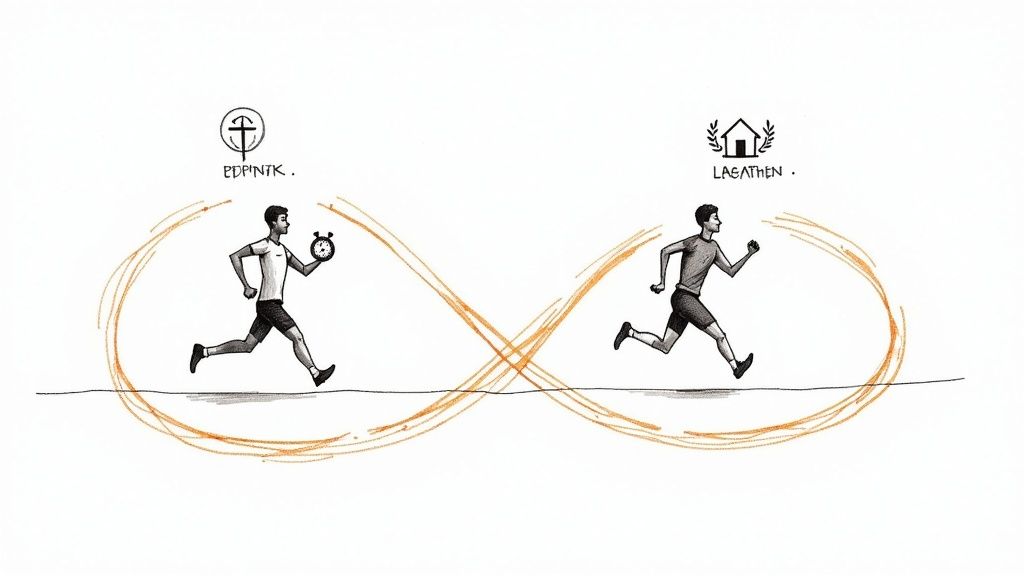
Too many short-term rental managers treat SEO and PPC like separate channels, operating in their own little worlds. SEO is the slow burn, focused on long-term organic growth. PPC is the quick win, chasing immediate, paid traffic.
But keeping them apart is a huge missed opportunity. When you integrate them, you create a cohesive marketing engine where each part makes the other stronger.
Here’s a better way to think about it: Your PPC campaigns are your R&D lab. They give you instant feedback on which keywords, ad copy, and offers actually get potential guests to click. SEO, on the other hand, is your long-term brand asset, building authority and generating a steady stream of low-cost traffic.
When you let them talk to each other, the data from your paid ads directly fuels a smarter, more effective organic strategy. This entire ecosystem falls under the umbrella of understanding Search Engine Marketing (SEM), which masterfully combines both tactics.
SEO vs PPC At a Glance
Before we get into the tactical playbook, let's do a quick side-by-side comparison. Understanding their core differences is key to seeing why they work so well together. Think of it as knowing the strengths of each player on your team.
| Characteristic | SEO (Search Engine Optimization) | PPC (Pay-Per-Click) |
|---|---|---|
| Cost | No direct cost for clicks, but it's an investment in content, site optimization, and time. | You pay a fee every time someone clicks your ad. Direct control over your budget. |
| Speed of Results | A long-term play. It can take months, sometimes longer, to see significant results. | Almost instant. You can start getting traffic within minutes of launching a campaign. |
| Visibility | Earned placement in the main search results, which builds incredible trust and credibility over time. | Paid placement at the very top of search results, giving you immediate visibility. |
| Sustainability | Once you rank, the traffic is consistent and can be maintained with ongoing effort. | As soon as you stop paying, the traffic stops. It requires a continuous budget. |
This contrast is what makes their partnership so powerful. You can use PPC to get immediate visibility for highly competitive keywords while your SEO efforts are still gaining traction. At the same time, the instant data from your PPC campaigns shows you the exact phrases guests are using to book.
You can then weave those high-converting keywords into your website content, blog posts, and property descriptions. Over time, you'll start ranking for them organically, allowing you to reduce your ad spend on those terms. It's a perfect feedback loop.
Here's the real kicker: When a brand appears in both the paid and organic search results for the same keyword, the overall click-through rate (CTR) can jump by up to 50%.
This double-dip effect establishes your brand as the go-to authority in your market. It builds massive trust and helps you capture clicks that might have otherwise gone to a competitor. In the cutthroat world of vacation rentals, maximizing every ounce of visibility is the name of the game.
Building a Unified Keyword Strategy
Managing separate keyword lists for your organic search and your paid ads is like having two rowers in a boat, paddling in completely different directions. You’ll probably move, but it's going to be chaotic and wildly inefficient. A unified strategy, on the other hand, gets both rowers in sync, creating a powerful feedback loop where SEO and PPC working together push your short-term rental brand forward with real purpose.
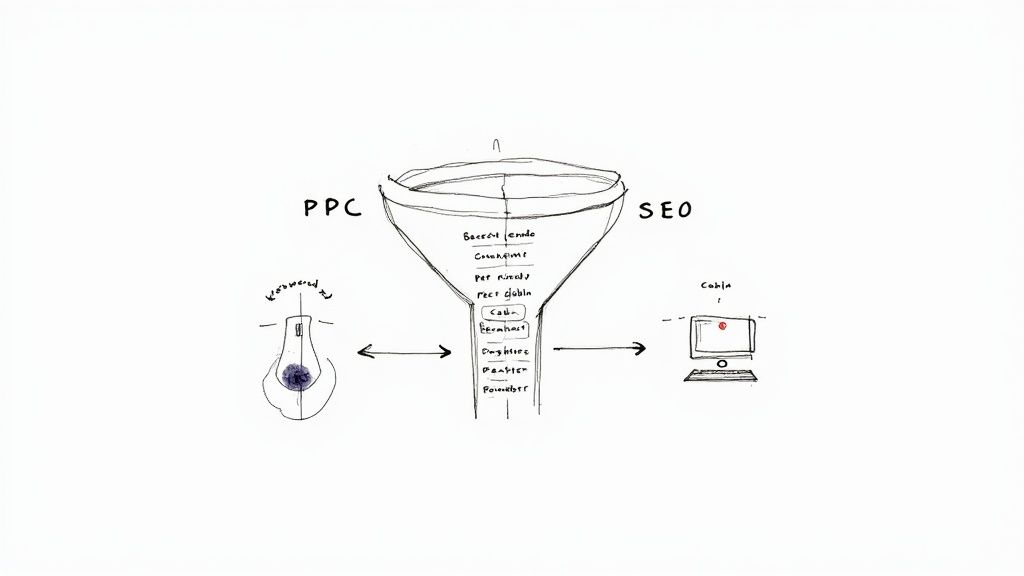
Think of your PPC campaigns as your own private keyword laboratory. You can instantly test out high-intent, transactional keywords to see which ones actually drive bookings. That speed is priceless for figuring out what your target audience is searching for right now.
Using PPC as Your Keyword Test Lab
Let's say you manage a portfolio of properties in Miami. Instead of just guessing which keywords are going to hit, you can spin up a targeted Google Ads campaign to put a few variations to the test.
- Test Keyword A: 'beachfront condo Miami'
- Test Keyword B: 'luxury Miami rental with pool'
- Test Keyword C: 'family-friendly Miami vacation home'
Within a matter of days, your PPC data will tell the story. You'll see which ad groups are getting the clicks and, more importantly, which ones are turning into actual booking inquiries. If 'beachfront condo Miami' is bringing in conversions at a cost that makes sense, you've just struck gold. You've found a money-making keyword.
This data-driven approach takes all the guesswork out of the equation. You're no longer running on assumptions; you're making smart, strategic decisions based on real-world booking behavior.
Once you’ve found these proven winners, it's time to "graduate" them into your long-term SEO strategy. These keywords become the bedrock for your property pages, your meta descriptions, and even your blog content. Because you've already proven they convert, the time and effort you pour into ranking for them organically has a much, much higher chance of paying off.
Uncovering Organic Gems with SEO Tools
While PPC is your ace for nailing down those high-intent keywords, your SEO tools are where you uncover the broader, informational queries. These are the questions potential guests are asking long before they're ready to pull out their credit card. For a property manager, these might look like:
- 'best time to visit the Smokies'
- 'what to pack for a Florida beach vacation'
- 'kid-friendly activities in Orlando'
Trying to run a direct PPC campaign on these informational keywords is usually a losing game—they're often expensive and have very low conversion intent. Bidding on 'best time to visit the Smokies' is not likely to result in an immediate booking. But creating a fantastic, high-quality blog post that ranks organically for that exact term? That establishes your brand as the go-to local expert.
This kind of top-of-funnel content grabs potential guests early in their planning stage, building trust and getting your brand name in their head. Later, when they're finally ready to book their 'pet-friendly cabin in the Smokies', you're the first one they think of. For a deeper look at finding these kinds of opportunities, check out our guide on vacation rental keywords.
This all creates a fantastic, continuous cycle of improvement. PPC gives you immediate, data-backed insights on what converts, which helps sharpen your SEO focus. In turn, a strong SEO foundation captures a wider audience at a lower cost, boosting your brand's authority and creating new remarketing opportunities for your future PPC campaigns. It’s an integrated approach that makes sure no potential guest ever slips through the cracks, no matter where they are in their booking journey.
Using PPC Data to Lower Acquisition Costs
This is where the real magic happens. We're going to turn the raw data from your paid campaigns into a direct, measurable drop in your customer acquisition cost (CAC).
When you build a workflow where PPC insights feed your organic strategy, every marketing dollar gets spent with data-backed confidence, not just guesswork. When SEO and PPC work together, they create a powerful, self-improving system for sustainable growth.
Imagine you're looking at your Google Ads report and see a landing page for "luxury ski chalets in Aspen" with a killer conversion rate. This isn't just a win for your paid search team; it's a goldmine of information for your entire marketing strategy.
That high conversion rate is a flashing neon sign. It's telling you that the page's layout, the property photos, the booking engine experience, and the call-to-action are all perfectly tuned to get a potential guest to book. It's a proven formula.
Replicating Paid Success in Your Organic Strategy
Once you've found a high-performing paid landing page, the next logical move is to clone its success across your organic pages. Your SEO team can break down what makes that page work so well and apply those winning elements to other property pages targeting similar long-tail keywords.
This completely bypasses the need for slow, cumbersome A/B testing on your organic pages.
Instead, you're using the rapid feedback loop from PPC to find what works, then scaling it across your entire site. This systematic approach lets you:
- Standardize Page Layouts: Apply the structure and flow of high-converting paid pages to your organic property listings.
- Optimize Visuals: Use the same style of high-resolution images or virtual tours that proved so effective in your ads.
- Refine Calls-to-Action (CTAs): Implement the exact button text and placement that drove bookings on your PPC landing pages.
This synergy puts your organic optimization on the fast track, creating a consistent, conversion-focused experience for every visitor, no matter how they found you.
A documented case study showed a company spending $40,000 annually on PPC for a specific set of keywords. By analyzing this data to optimize their organic content, they successfully captured those leads organically, knocking out a competitor and drastically lowering their cost per acquisition. You can get more details about how PPC data fuels SEO wins on seerinteractive.com.
Uncovering Hidden Gems in Search Query Reports
Beyond landing page performance, your PPC search query reports offer an unfiltered look into the mind of your ideal guest. These reports show you the exact phrases people typed into Google right before they clicked your ad. This is far more valuable than just relying on keyword research tools, which are often just giving you estimates.
For instance, your keyword research might suggest targeting "pet-friendly cabin Gatlinburg." But your search query report could reveal that your actual guests are searching for much more specific terms like:
- "Gatlinburg cabin with fenced yard for dogs"
- "2 bedroom pet-friendly cabin near downtown Gatlinburg"
- "Gatlinburg cabin no pet fee"
This is pure gold. These are the natural language phrases your real customers are using, right now. You can take these proven, high-intent queries and inject them directly into your SEO strategy—optimizing meta titles, H1 tags, image alt text, and property descriptions.
This level of precision significantly boosts your organic click-through rate because your search result snippets will perfectly match what the searcher is looking for. You are, quite literally, speaking their language. This data also helps you refine your negative keyword lists, stopping your ads from showing for irrelevant searches and saving you money. For more on this, check out our comprehensive list of negative keywords to protect your budget.
Ultimately, using PPC data to inform your SEO is about making smarter, more efficient decisions. It transforms your ad spend from a simple traffic-driver into a powerful research tool that builds a more profitable, long-term organic asset.
Alright, let’s move past the basics and get into the really powerful stuff—the strategies where SEO and PPC working together directly lead to more heads in beds. These are the advanced moves that create a complete system, one that not only grabs a guest's attention but actively pulls them back to finish booking.
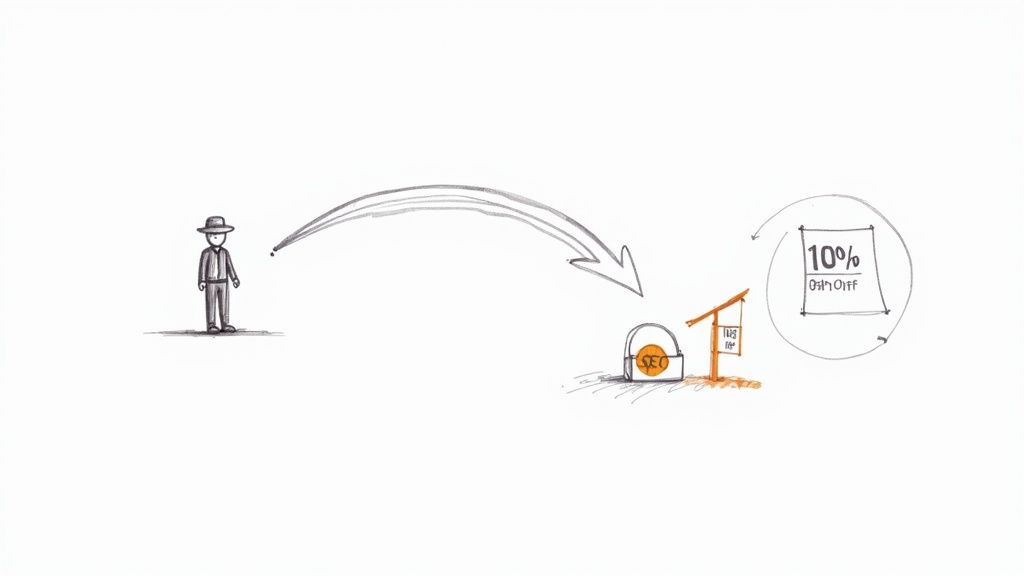
We're going to dig into two game-changing techniques: mastering the remarketing loop to win back those "just browsing" visitors, and building a unified landing page strategy that makes both Google and your future guests happy.
Master the Remarketing Loop
Picture this: a potential guest finds your "oceanfront condo in Destin" page through a great organic search result. They're clicking through photos, checking out the amenities... but then they leave. Maybe their boss walked by, or they wanted to check flight prices first. In a disconnected marketing plan, that lead is gone forever.
But when your channels are integrated, this is where the conversation really starts.
This is the magic of the remarketing loop. By placing a tracking pixel on your website, that specific visitor gets added to a special remarketing audience. Now, as they browse other travel blogs or scroll through their social media feed, your PPC display ads can show up, reminding them of your property.
The key here is precision. You’re not just hitting them with a generic ad for your brand. You're showing them an ad for the exact property they were just looking at, maybe sweetened with an offer like "10% off this week only" to add a little urgency.
This hyper-targeted approach keeps your rental top-of-mind. It's the perfect little nudge to bring them back and lock in that booking. You’ve basically used your strong SEO foundation to build a pre-qualified audience for your incredibly efficient PPC campaigns. It’s a beautiful thing.
Build a Unified Landing Page Strategy
A classic mistake is to create two different kinds of pages: dense, content-rich pages for SEO and stripped-down, direct-to-the-point pages for PPC. This is not only inefficient, it creates a clunky and inconsistent experience for visitors. A much smarter approach is to build a single "super-page" that's perfectly tuned for both channels.
This unified page is the best of both worlds. For search engines, it has all the rich, detailed content they love for organic rankings, like:
- In-depth property descriptions that naturally weave in relevant long-tail keywords.
- High-quality photo galleries and virtual tours that keep people on the page longer.
- Detailed lists of amenities and local attractions to answer every possible question.
- Helpful links to blog posts about the area or other properties you manage.
But at the same time, this "super-page" is a conversion machine, built with the critical elements for PPC success:
- Lightning-fast load times so impatient users don't bounce.
- Clear, compelling calls-to-action (CTAs) right at the top of the page.
- A seamless, mobile-friendly booking process for travelers on the go.
- Trust signals like guest reviews and secure payment logos.
The synergy here pays off big time for your ad spend. Google's Quality Score, which is a key factor in determining your ad costs, loves landing pages with relevant content and a fantastic user experience. When you send your PPC traffic to a rich, optimized page, you can dramatically improve your Quality Score.
A higher Quality Score means your ads get shown more often and—most importantly—you pay less for every single click. This integrated approach doesn't just make for a better guest experience; it makes your entire marketing budget work harder, stretching every dollar further.
Putting Your Integrated Strategy into Action
Theory is nice, but results are what matter. The real magic happens when you connect these SEO and PPC strategies to the right tools, turning a smart plan into a non-stop booking machine. This is where we close the loop.
When you use technology to get your SEO and PPC efforts talking to each other, you're not just running campaigns; you're building a cohesive system. Every click and every lead gets captured, nurtured, and converted into a happy guest. It’s how you create a powerful, automated engine for growth.
Just imagine taking all that hard-won PPC keyword data—the specific phrases you know convert, like "3-bedroom rental with pool near Disney"—and using it to generate thousands of perfectly optimized landing pages automatically. That's the core idea behind programmatic SEO, and it’s a game-changer.
Automate Your Organic Footprint
Programmatic SEO platforms, like the hostFront feature inside hostAI, are built for this. They take the keywords that you’ve already proven work in your paid campaigns and use them to spin up highly specific pages at an incredible scale. Instead of spending weeks manually building a handful of property pages, the system can create a unique page for every single property, location, and amenity combination that travelers are searching for.
This means you can suddenly have thousands of hyper-relevant pages targeting those valuable long-tail keywords, such as:
- "Pet-friendly cabin in Gatlinburg with hot tub"
- "Oceanfront condo in Destin with private beach access"
- "Ski-in/ski-out chalet in Aspen for 12 guests"
The best part? Each page is optimized right out of the gate because it's built on data you’ve already validated. This approach lets you rapidly expand your organic reach, pulling in high-intent search traffic that would be way too expensive or niche to chase with paid ads alone. It’s the smartest way to scale your SEO.
Spread Your Content Far and Wide
Creating thousands of pages is a huge first step, but you still need to get eyeballs on them. This is where content distribution tools come into play, giving both your paid and organic efforts a massive boost at the same time.
A tool like hostDistro, for example, can automatically push your property listings and content out to a whole network of relevant travel sites, social media channels, and online marketplaces. This does two things at once: it builds valuable backlinks that tell Google you're a legitimate authority (boosting your SEO), and it drives direct referral traffic.
By getting your content out there, you create more chances for potential guests to find you. Someone might discover your property on a travel blog, see your PPC ad later that day, and then stumble upon your organic listing. That's a powerful trifecta that builds serious brand trust.
This multi-channel approach makes your brand feel bigger and more credible, ensuring your properties show up wherever your target audience is looking.
Close the Loop with Smart Email Automation
Okay, so you've got traffic coming in from all sides. Now what? You need a system to catch every single lead and nurture them effectively. This is where email automation becomes the glue holding your entire strategy together.
Platforms like hostMail let you set up automated email sequences that engage potential guests from the moment they show interest. It doesn't matter if they signed up for your newsletter from a blog post (SEO traffic) or filled out a form on a landing page (PPC traffic)—they're immediately dropped into a nurturing workflow.
This creates a seamless journey from a casual search to a confirmed booking. The system can send follow-ups, share special offers, and keep your properties top-of-mind, turning window shoppers into booked guests without you lifting a finger. It’s the final, crucial piece for turning all that hard-earned traffic into actual revenue.
Measuring Your Combined Success
So, you're running SEO and PPC in tandem. How do you actually know if it's working?
To prove your integrated strategy is paying off, you have to look beyond the simple, channel-specific metrics. Clicks and impressions are fine, but they don’t tell you the whole story of how SEO and PPC working together are actually impacting your bookings and your bank account. Real success is found by tracking blended Key Performance Indicators (KPIs) that reveal the true health of your entire search presence.
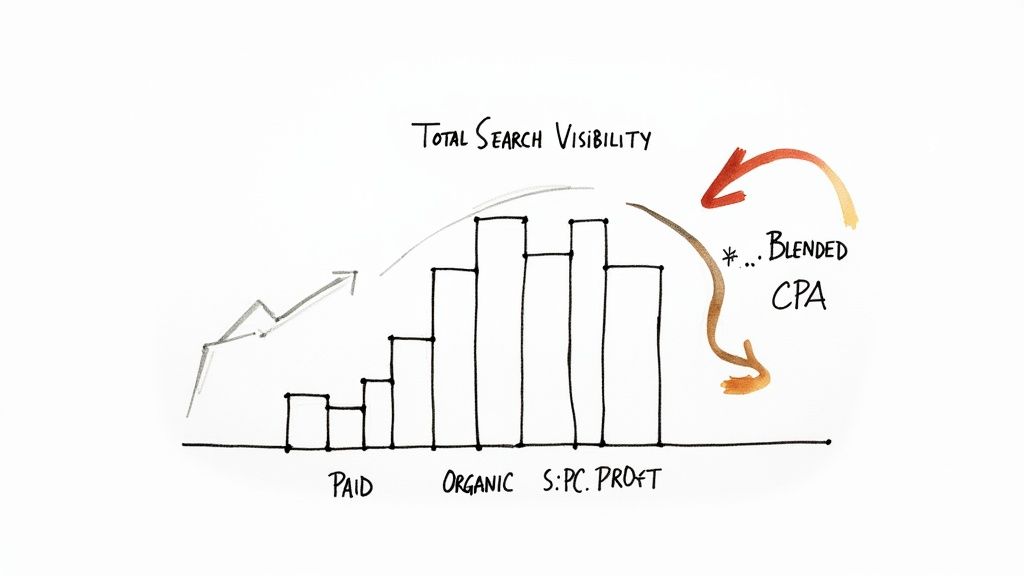
It’s time to stop asking "How did my ads perform?" or "How are my rankings?" The better question is, "How visible is my brand across all of search?" Answering that is what separates the good marketers from the great ones.
Focus on Blended KPIs
To get that clear, big-picture view, you need to track metrics that combine both your paid and organic results. This approach helps you see the total impact and efficiency of every dollar and hour you invest.
Start with these two essentials:
- Total Search Visibility: This is your brand's combined share of voice for the keywords that matter most. It pulls together your organic ranking position and your paid ad impression share, giving you a single percentage of how often potential guests see your properties when they're looking. If this number is climbing, you're dominating the search results page.
- Blended Cost Per Acquisition (CPA): Don't calculate CPA for SEO and PPC in their own silos. Blend them. Just divide your total marketing spend (PPC ad budget + SEO investment) by the total number of bookings you got from both channels. This gives you one powerful metric showing the true cost to acquire a guest, reflecting the synergy you’ve built.
Of course, to measure this all correctly, you have to get your tracking in order. A huge piece of this puzzle is understanding What is Marketing Attribution, which is all about giving credit where credit is due between your SEO and PPC efforts. Setting up solid UTM parameters is non-negotiable here. Our guide on UTM best practices will get you started on the right foot.
Adopt a Phased Budget Model
An integrated strategy needs an integrated budget. Forget setting rigid annual budgets for each channel and never touching them again. It’s much smarter to think in phases, allowing you to shift your investment based on what the data is telling you and how mature your marketing is.
We’ve seen a phased approach work wonders. You start with a PPC-heavy launch, putting maybe 80% of your budget into PPC and 20% into SEO. Over time, as your organic presence strengthens, you gradually flip that. After about 18 months, you could be looking at a 70-80% SEO and 20-30% PPC split.
This framework isn't just a guess; it's backed by solid benchmarks. Well-run PPC campaigns can deliver a 200% average ROI right out of the gate, while SEO’s true value compounds over the long haul.
This model is all about using PPC's speed to get crucial booking data and immediate revenue. As your organic authority builds up, you can dial back your ad spend, which in turn lowers your Blended CPA and creates a much more profitable, sustainable booking engine for your business.
Got Questions? We've Got Answers.
When you start blending SEO and PPC, a few questions always pop up. It's completely normal. Getting these sorted is the key to building a search strategy that actually drives bookings for your short-term rental brand. Let's tackle the big ones.
Will My PPC Ads Steal Clicks From My Organic Listings?
This is probably the number one concern we hear, but the data tells a fascinatingly different story. When your property shows up in both paid and organic search results, you're not competing with yourself—you're dominating the page. Think of it as owning more prime real estate on the SERP.
This "double-dip" effect actually boosts your brand's credibility and visibility, leading to a higher total click-through rate than either channel could ever get on its own. The goal isn't just to rank; it's to own the entire conversation, grabbing clicks that might have otherwise gone to a competitor whose ad popped up right above your organic link.
How Long Until I Actually See Results?
This is a tale of two timelines, which is exactly why these two strategies work so well together.
With PPC, you'll see results almost instantly. We're talking hours or days after you launch a campaign. This gives you a quick flood of traffic and, more importantly, immediate data on which keywords are turning into actual bookings. It’s your fast track to learning what really works.
SEO, on the other hand, is the long game. Fueled by all that great data from your PPC campaigns, you can expect to see real, meaningful movement in your organic rankings within 3 to 6 months. The magic happens over time; after about 12-18 months, you should have such a strong organic foundation that you can start dialing back your PPC spend without losing momentum.
What’s the Right Budget Split for a New STR Brand?
If you're just starting out, a smart approach is the 80/20 split: put 80% of your budget into PPC and 20% into SEO. Why? Because you need data and you need bookings, fast. The speed of PPC is your best friend in the early days for figuring out what converts.
Over that first year, as your SEO starts to kick in and you climb the rankings, you can begin to shift that balance. A well-established brand might eventually land on a 30/70 split, with the bulk of their budget supporting the powerful, high-ROI organic channel they've built into a sustainable booking machine.
Ready to build a powerful, integrated search strategy that drives more direct bookings? hostAI provides the tools you need, from programmatic SEO with hostFront to automated email nurturing with hostMail. See how our platform can double your direct revenue at https://gethostai.com.